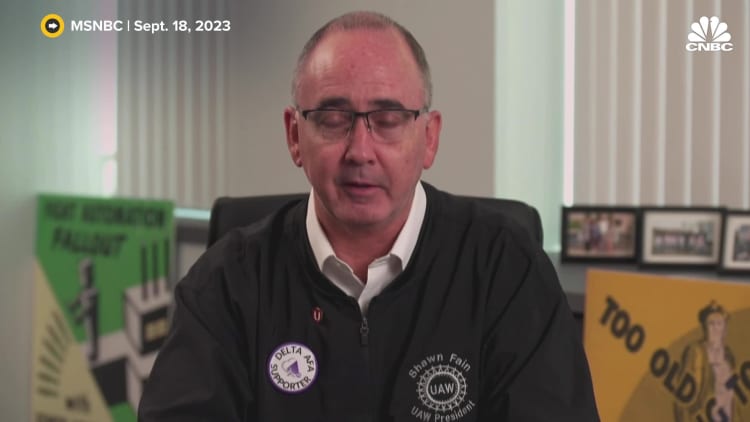Blue Cross Blue Shield employees show their support to members of the United Auto Workers (UAW) union as they march through the streets of downtown Detroit following a rally on the first day of the UAW strike in Detroit, Michigan, on September 15, 2023.
Matthew Hatcher | AFP | Getty Images
DETROIT – On Monday night, UAW President Shawn Fain announced that the United Auto Workers union will declare additional strikes at General Motors, Ford Motor, and Stellantis plants if “serious progress” is not achieved in negotiations by noon ET on Friday.
This announcement comes just over a week after the union initiated targeted strikes at assembly plants of the Big Three Detroit automakers, resulting in around 12,700 workers going on strike.
Fain stated in a union video that “Autoworkers have waited long enough to make things right at the Big Three. We’re not waiting around, and we’re not messing around. So, noon on Friday, Sept. 22, is a new deadline.”
Fain had previously indicated that the union intended to escalate the work stoppages based on the progress of negotiations with the companies. This latest development follows meetings between the union and each automaker since the initial strikes began on Friday.

Unlike the previous contract deadlines, Fain did not specify that tentative agreements had to be reached to avoid additional strikes; he only demanded “serious progress.” The union has not yet provided a clear definition of what constitutes “serious progress” other than reaching a tentative deal.
Currently, workers at GM’s midsize truck and full-size van plant in Wentzville, Missouri; Ford’s Ranger midsize pickup and Bronco SUV plant in Wayne, Michigan; and Stellantis’ Jeep Wrangler and Gladiator plant in Toledo, Ohio are on strike.
The union strategically selected these plants for targeted strikes as Fain and UAW leaders simultaneously negotiate with all three automakers. These targeted strikes are referred to as “stand-up strikes,” a reference to the historic “sit-down” strikes by the UAW in the 1930s.
“The ‘Stand Up Strike’ is a new approach to striking. Instead of striking all plants all at once, select locals have been called on to ‘Stand Up’ and walk out on strike. If the automakers fail to make progress in negotiations and bargain in good faith going forward, more locals will be called on to Stand Up and join the strike,” said Fain.
Targeted strikes typically focus on key plants that can disrupt production at other plants due to a shortage of parts. While not unprecedented, the way the union is conducting these strikes is unconventional.
GM and Ford issued general statements regarding the ongoing negotiations but did not directly comment on the union’s deadline. Stellantis referred to a statement released earlier in the day, indicating that discussions with the union were “constructive and focused on finding common ground.”
Despite automakers offering generous deals to the union, such as hourly wage increases of approximately 20%, bonuses worth thousands of dollars, and maintaining platinum healthcare benefits, the union plans to proceed with additional strikes.
The union’s key demands include a 40% increase in hourly pay, a reduced 32-hour workweek, the reintroduction of traditional pensions, the elimination of compensation tiers, and the restoration of cost-of-living adjustments, among other priorities.














